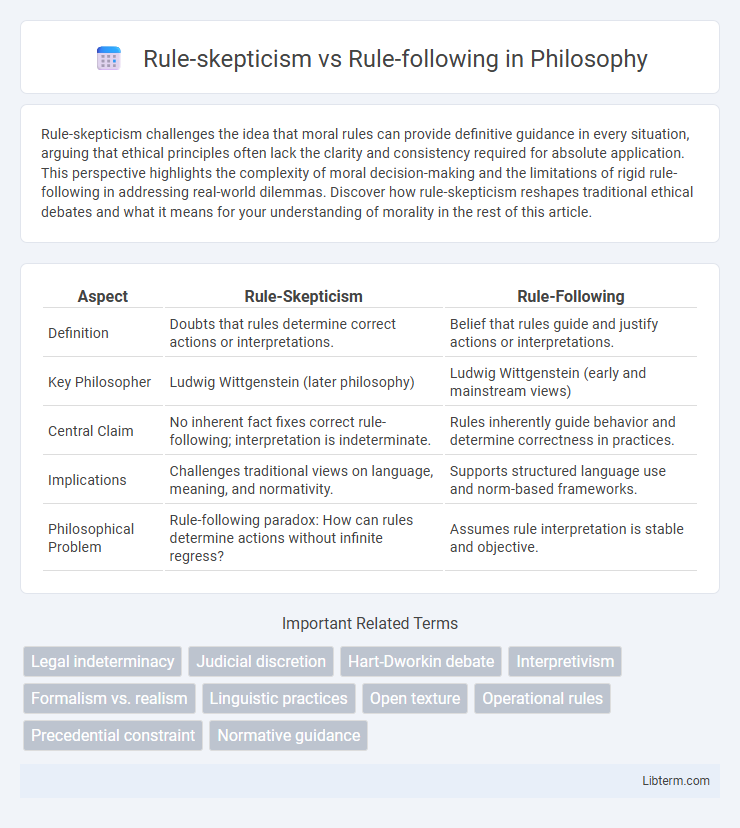Rule-skepticism challenges the idea that moral rules can provide definitive guidance in every situation, arguing that ethical principles often lack the clarity and consistency required for absolute application. This perspective highlights the complexity of moral decision-making and the limitations of rigid rule-following in addressing real-world dilemmas. Discover how rule-skepticism reshapes traditional ethical debates and what it means for your understanding of morality in the rest of this article.
Table of Comparison
| Aspect | Rule-Skepticism | Rule-Following |
|---|---|---|
| Definition | Doubts that rules determine correct actions or interpretations. | Belief that rules guide and justify actions or interpretations. |
| Key Philosopher | Ludwig Wittgenstein (later philosophy) | Ludwig Wittgenstein (early and mainstream views) |
| Central Claim | No inherent fact fixes correct rule-following; interpretation is indeterminate. | Rules inherently guide behavior and determine correctness in practices. |
| Implications | Challenges traditional views on language, meaning, and normativity. | Supports structured language use and norm-based frameworks. |
| Philosophical Problem | Rule-following paradox: How can rules determine actions without infinite regress? | Assumes rule interpretation is stable and objective. |
Understanding Rule-Skepticism and Rule-Following
Rule-skepticism challenges the assumption that rules possess inherent, fixed meanings, emphasizing instead the fluidity and context-dependence of rule interpretation. Rule-following involves applying established norms or protocols consistently, but understanding its limits requires recognizing that rules do not determine actions unequivocally or exhaustively. Philosophers like Wittgenstein highlight that rule-following is a social practice grounded in communal agreement rather than strict, objective criteria, making the interplay between skepticism and adherence essential in comprehending normative behavior.
Philosophical Foundations of Rule-Skepticism
The philosophical foundations of rule-skepticism are rooted in the challenges posed to the notion that rules inherently determine meaning or behavior, emphasizing ambiguity and the interpretative flexibility of language. Rule-skepticism draws heavily on Ludwig Wittgenstein's later philosophy, particularly his concept of language games and the critique of private language, suggesting that rule-following is a communal and context-dependent practice rather than a rigid, mechanical process. This viewpoint questions the objective grounding of rules, highlighting the role of social practices and ordinary language in shaping the understanding and application of any rule.
Origins and Development of Rule-Following Theory
The origins of rule-following theory trace back to Ludwig Wittgenstein's later philosophy, particularly in his work "Philosophical Investigations," where he explores how language and meaning depend on communal rule-following practices. Rule-skepticism challenges the objectivity of rules by questioning how individuals can be certain they follow rules correctly without an external standard. The development of rule-following theory has since integrated perspectives from ordinary language philosophy, pragmatism, and cognitive science to address how social norms and practices provide the foundation for understanding and applying rules.
Key Arguments for Rule-Skepticism
Rule-skepticism challenges the notion that rules inherently determine correct actions, emphasizing the indeterminacy and interpretative nature of rules in practical application. Key arguments highlight the infinite regress problem, where following a rule always requires another rule to interpret it, leading to an unresolvable chain. Wittgenstein's critique underscores that meaning is established by communal practices, not by any fixed rule, thereby questioning the objectivity of rule-based reasoning.
Main Criticisms of Rule-Following
Main criticisms of rule-following emphasize its reliance on rigid interpretations that overlook situational nuances and the fluidity of language. Critics argue that strict adherence to rules fails to account for the diversity of contexts in which language operates, thereby limiting genuine understanding and creating paradoxes in applying universal norms. This skepticism highlights the challenge of establishing objective criteria for correctness without invoking circular justifications or infinite regress in interpretation.
Rule-Skepticism in Legal Philosophy
Rule-skepticism in legal philosophy challenges the notion that legal outcomes can be determined solely by applying clear rules, emphasizing the indeterminacy and interpretative nature of law. It argues that legal rules are often vague or contradictory, requiring judges to exercise discretion and subjective judgment rather than mechanical rule-following. This perspective undermines legal formalism and supports theories like legal realism, which highlight the role of social, political, and personal factors in judicial decision-making.
Rule-Following in Everyday Practices
Rule-following in everyday practices manifests as the implicit adherence to social norms and routines that structure daily life, enabling predictable and cooperative interactions. These practices rely on shared understandings and contextual interpretations, where individuals continuously interpret and apply rules without explicit deliberation. Consistent rule-following fosters social order and trust, underscoring its foundational role in sustaining communal and institutional frameworks.
Notable Thinkers: Wittgenstein, Hart, and Beyond
Wittgenstein's concept of rule-following highlights the inherent ambiguity in interpreting linguistic rules, suggesting that meaning arises from communal practice rather than fixed definitions. H.L.A. Hart challenges strict legal formalism by emphasizing the internal point of view of rule-following in law, where rules gain significance through social acceptance and practice. Beyond these thinkers, contemporary debates explore how rule-skepticism questions the determinacy of rules, impacting jurisprudence, linguistic philosophy, and cognitive science by scrutinizing the stability of rule-guided behavior within normative systems.
Practical Implications for Decision Making
Rule-skepticism challenges the notion that rules can provide definitive guidance, urging decision-makers to interpret rules contextually and exercise judgment rather than strict adherence. In contrast, rule-following emphasizes consistency and predictability by adhering closely to established guidelines, which can streamline decisions but limit flexibility. Balancing both approaches enhances practical decision-making by fostering adaptability while maintaining a coherent framework for action.
Reconciling Rule-Skepticism and Rule-Following
Reconciling rule-skepticism and rule-following entails identifying how individuals apply rules reliably despite philosophical doubts about their inherent determinacy, as explored in Ludwig Wittgenstein's concept of rule-following paradox. This process involves acknowledging the role of communal practices and shared forms of life that provide normative frameworks, enabling consistent interpretation and application of rules. Emphasizing pragmatic consensus and social context bridges the gap between skepticism and the functional use of rules in language and behavior.
Rule-skepticism Infographic

 libterm.com
libterm.com